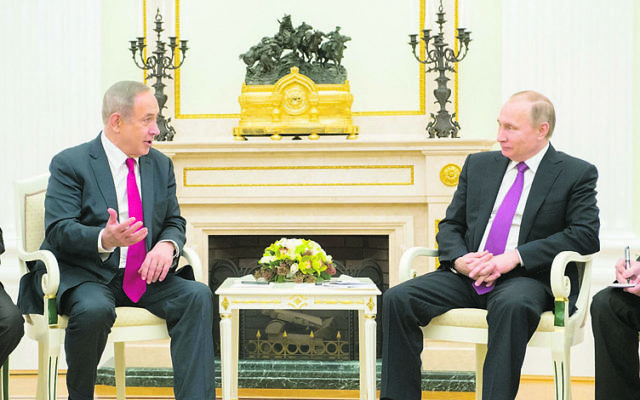Fatal plane shooting fractures Russia relations
In the wake of Syria downing a Russian plane – which Russia is blaming on Israeli activity in the area – Moscow is supplying Syria with a new missile system which could impact on Israel's security, writes Nathan Jeffay.
THE Israel-Russia relationship is back from the brink of crisis — but Jerusalem has been left to swallow a very bitter pill.
The Syrian regime is to have a a S-300 surface-to-air missile system within two weeks. Russia decided on Monday to supply the system, which could potentially make it far harder for Israel to preempt a future Iranian strike.
Moscow claimed that this is an “adequate response” to Israel’s alleged role in setting the stage for Russian deaths.
A Russian plane was shot down over Syria last week, killing 15 Russian soldiers. The Syrian military fired the shots, but Russia claims that “blame for the tragedy” lies “with the Israeli Air Force”.
Russia has been seething with Israel since the September 17 incident, and for several days it looked like a serious diplomatic clash was brewing. Things have calmed slightly, but on Sunday Russian military spokesman Igor Konashenkov gave a 15-minute presentation blaming Jerusalem.
He argued that the Syrians were only firing because Israel had been operating in the area, and their presence created “a direct threat” to other planes. He also claimed that Israel had been using the Russian plane as a shield against Syrian defences, and that Israel gave Russia “misleading” information.
Less than 24 hours after Konashenkov’s presentation, Russia decided to provide Syria with the S-300 system. Israeli Prime Minister Benjamin Netanyahu decried the decision in a phone call with Russian President Vladimir Putin, alarmed by the prospect of Syria — a close ally of Iran — getting an emboldened arsenal.
America’s National Security Adviser John Bolton has accused the Russians of a “significant escalation” by supplying the missiles, and Israeli Prime Minister Benjamin Netanyahu has voiced dismay to Russian President Vladimir Putin.
Netanyahu told Putin that “transferring advanced weapons systems into irresponsible hands will increase the dangers in the region,” according to a summary of the conversation released by his office.
Analysts say that the latest events are the clearest indication yet of the challenges of Israel now living in Russia’s shadow. “It’s a new world,” Jonathan Dekel-Chen, an expert in Israel-Russia relations from Hebrew University, told The AJN. “This is the first time you have Russian troops, air force and navy in Syria in what looks to be a permanent arrangement. This is a long way from what we have experienced before.”
Dekel-Chen said that both Russia and Israel have good reason to invest in their relationship, but said that it is a “very complicated political and military landscape”.
As well as supplying the new missile system, Russia now plans to jam satellite navigation, on-board radars and communication systems of planes operating above Syria. This is a game changer for Israel, as until now, Russia has accepted that Israel strikes Hezbollah and Iranian targets in Syria, and hasn’t interfered with Israeli operations. If Russia jams communications, Israel will find it much harder to operate.
The Israeli military rejects Russia’s accusations about its conduct. “The IAF did not hide behind any aircraft, and the Israeli aircraft were in Israeli airspace at the time of the downing of the Russian plane,” said the IDF.
On Tuesday Netanyahu said, “This morning I convened the Security Cabinet which received a full update on the recent events. The Security Cabinet ministers also share in the deep sorrow of the Russian families and the Russian people
“We give full backing to the IDF in its actions to defend the state. We will continue to take action to prevent the establishment of an Iranian military presence in Syria and we will continue the security coordination between the IDF and the Russian military.
“To this end, I agreed with President Putin that IDF and Russian military working teams would meet soon. We will do what is necessary to defend the security of Israel.”
NATHAN JEFFAY


comments